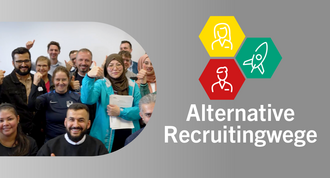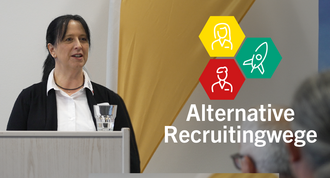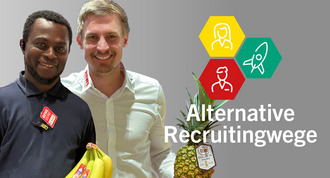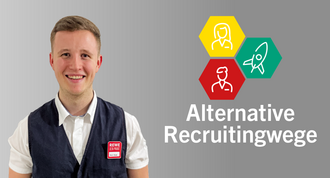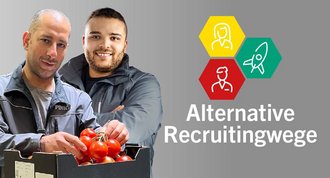
As an HR expert at the Recruiting Centre North, Katharina Oriwall attaches great importance to finding a common thread in the CVs of new employees. She adapts her expectations for the partial qualification project. This allows initially inexperienced and insecure candidates to develop into reliable employees.
one: You work at the interface between the REWE and PENNY stores that need workers, the job centres that want to get people into work and the training providers that provide the necessary skills. How does this work in practice?
Katharina Oriwall : The impetus usually comes from the regions' recruitment departments. However, job centres sometimes also ask us whether we would like to implement a partial qualification project with them. Then we become active. The first step is for the job centre to identify potential candidates. These are then placed in a preliminary programme in which we can get to know the candidates and their strengths and areas of learning better. Of course, this also gives the candidates the opportunity to get to know us. We then present our personnel proposals to the sales department and arrange meetings to get to know each other. If it suits both sides, we offer the candidates the opportunity to take part in the qualification programme.
one: What is important for a successful match to be made?
Katharina Oriwall: Picking up the senior managers well and giving them specific information! Specifically: to dampen their expectations. The partial qualification project is not yet widely recognised as an alternative recruiting option in our company. That's why we often have to remind them that the people we put forward are job centre candidates with a wide range of obstacles who want to use the partial qualification programme to enter or re-enter working life.
one: What are the biggest challenges for participants in the qualification programme?
Katharina Oriwall : Sometimes it's the little things that result from participants not knowing the procedures. For example, they don't sign off properly if they are unable to come to work due to illness. Some people also find it difficult to be on time in the morning, at least at the beginning. Perhaps because they have lost their daily structure due to long periods of unemployment or have underestimated that working in retail can be physically demanding. We must also not forget that the participants include refugees and people with a migration background who come from other cultural backgrounds and may not yet be familiar with our product ranges in the store.
one: How can support be provided here?
Katharina Oriwall: The social pedagogues from the educational partners who accompany the programme provide important support here. Their discussions with the participants often lead to candidates with initial difficulties developing into reliable employees.
one: Why haven't participants in the programme been able to find a qualified permanent position in the past?
Katharina Oriwall: There are many different reasons for this. Some have not been able to complete their training due to a difficult family situation. Others, especially refugees, find it difficult to gain a foothold in the labour market due to a lack of language skills. Still others have changed jobs every few months in the past.
one: How does the exchange with the training providers work?
Katharina Oriwall: We have a very intensive and good working relationship. This is also important because the employees of the training providers are often the first point of contact for the participants in the partial qualification programmes. They tell us about their worries and needs. In order to always have the best possible training partner among the training providers, we conduct a pitch for each new programme: Every training provider who wants to work with us has to reapply or qualify. It's not an off-the-shelf partial qualification programme
one: What is going well with the partial qualification programme and where is there still room for improvement?
Katharina Oriwall: With the partial qualification programme, we are addressing a target group that we have not previously considered in our recruiting. This is important due to the changed situation on the labour market, because the days when we received applications by the basketful are over. However, we need a lot of patience to integrate these new employees. Our work in the recruiting project would be easier if the partial qualification project was better known at job centres. As it is, however, we have to do a lot of educational work and often start from scratch with many contact persons.
Back to working life
The shortage of skilled labour is reflected in falling numbers of applicants. At the same time, there are around 1.5 million people who are unemployed and low-skilled, i.e. who have not completed vocational training. This is precisely where the Recruiting Centre's pilot project comes in: Together with the Federal Employment Agency, local job centres and educational partners, long-term unemployed and low-skilled workers are being trained for sales jobs in REWE and PENNY stores as part of a partial qualification (TQ).
We wanted to know from the participants how the project has helped them get back into work. We asked retailers, district managers, store managers and HR partners how it is helping them locally to combat the shortage of skilled labour. Employees from the Federal Employment Agency and training providers explain how they support the project.



